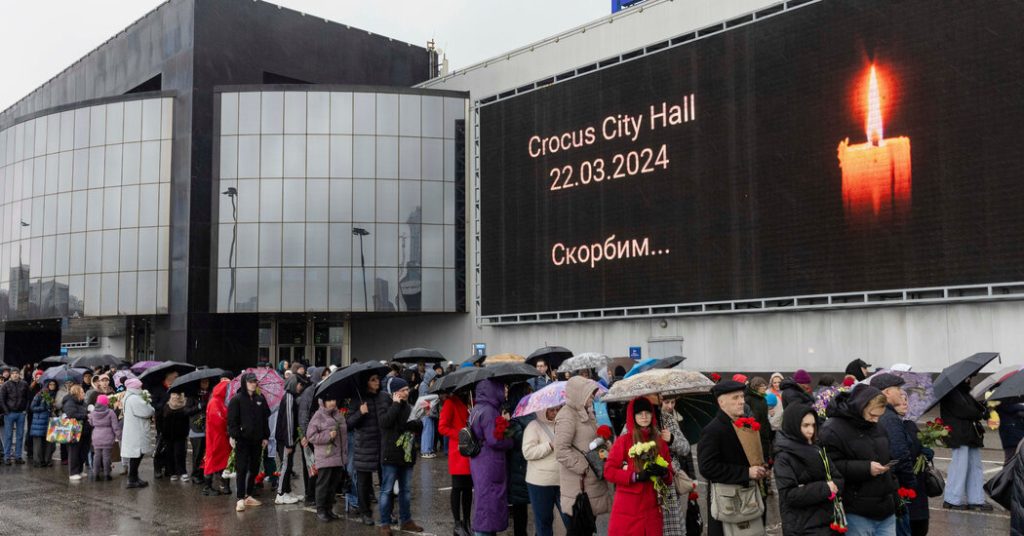As Russians grieved Monday for victims of the bloody assault on a concert hall near Moscow that killed at least 137 people, President Vladimir V. Putin was scheduled to meet with government officials to discuss the tragedy, the worst such attack in the capital in two decades.
The government appears to be stepping up efforts to pin the blame on Ukraine. On Sunday, hours after a district court arraigned four men suspected of carrying out the Friday night attack, the main evening news shows on Russia’s main television channels featured reports suggesting that Ukraine was responsible.
The main message was that Western countries were pushing a theory that the Islamic State was behind the attack, which took place at Crocus City Hall on the outskirts of Moscow, to shift blame away from Ukraine.
“The United States and Europe understand that any connection between Ukraine and the attack against Crocus City Hall would be suicidal for Kyiv and the whole anti-Russian alliance,” said one anchor, Dmitri Melnikov, in a report on Vesti Nedeli, the flagship weekly news show on Rossiya-1, the main state-owned television network.
The Islamic State has claimed responsibility for the attack. And the United States has said that the assault was the work of an ISIS offshoot, the Islamic State in Khorasan, and that there was no evidence implicating Ukraine. Ukraine has denied any involvement.
President Emmanuel Macron of France said on Monday that his country’s intelligence services and their partners had determined that “an Islamic State entity masterminded the attack and carried it out.”
France on Sunday raised its terror alert to its highest level. Mr. Macron said that the Islamic State entity, which he did not name, had tried to carry out attacks in France in the past few months.
On Monday, mourners across Russia streamed to take flowers to spontaneous memorials. Many Russians were also going to hospitals to donate blood, state news media reported.
Three shopping malls belonging to the company that owns the concert hall said that they would be closed indefinitely. Emergency workers continued to clear the debris inside the concert hall.
A general sense of anxiety among Russians was exacerbated by bomb threats on Sunday that prompted the evacuation of shopping malls in Moscow and in other Russian cities.
But the coverage by Russian state news outlets reflected how the Kremlin seemed determined to muster its resources against what it apparently sees as its main enemy: Ukraine, backed by a coalition of Western states.
Russian investigators have not disclosed any evidence suggesting that the four suspects, men from Tajikistan who were migrant workers in Russia, have a connection to Ukraine.
In the news reports, Russian state television presented the location of their arrest — the Bryansk region of Russia that borders Ukraine — as evidence of Ukrainian involvement. The reports also suggested that Kyiv could have hired them to mount the attack.
Tatiana Stanovaya, head of the France-based political analysis firm R.Politik, said that the Russian news outlets’ focus on Ukraine was “purely political in nature and is likely aimed at internal consumption.”
Ms. Stanovaya noted in a social media post that Mr. Putin had been careful not to put blame for the attack squarely on Ukraine.
In a statement on Saturday about the tragedy, Mr. Putin said that the suspects had been “heading toward Ukraine” and that “according to preliminary information, a window was prepared for them on the Ukrainian side to cross the state border.”
Mr. Macron said that France had offered to cooperate with Russia to investigate the Islamic State affiliate, adding that it would be a mistake to try and divert blame for the attack elsewhere.
“I think that it would be both cynical and counterproductive for Russia itself and the security of its citizens to use this context to try and turn it against Ukraine,” Mr. Macron said.
Dmitri S. Peskov, the Kremlin’s spokesman, said on Monday that Mr. Putin would meet with Russian government officials and the heads of the Moscow region to discuss unspecified measures to be taken after the attack.
Mr. Peskov said he would not comment on the course of the investigation.
“We urge you to rely on the information that comes from our law enforcement agencies,” Mr. Peskov said in comments reported by the news agency Interfax. He added: “The investigation is ongoing. No coherent theory has been published yet. There was only preliminary data.”
The four suspects, according to their brief appearances in court, were foreign migrant workers who spoke little or no Russian. In videos of their court appearances, they looked severely beaten, and footage of their being tortured during interrogation, which has been verified by The New York Times, circulated widely on social media. One of the suspects, Muhammadsobir Z. Fayzov, 19, was rolled into the courtroom in a wheelchair.
The arrest of the four suspects has raised questions about the regulation of labor migration into Russia. Mikhail Sheremet, a lawmaker, told the state agency RIA Novosti that he would push for the reintroduction of capital punishment in Russia.
Aurelien Breeden contributed reporting from Paris.

